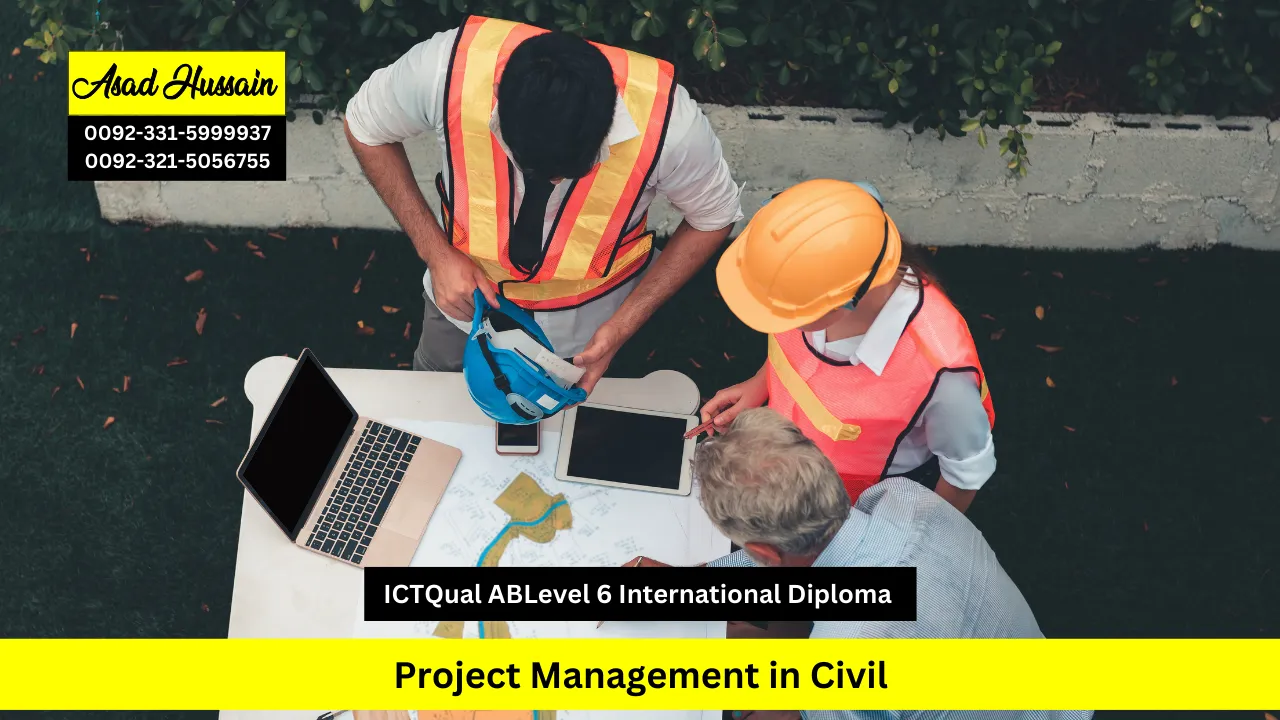The civil engineering and construction sector plays a critical role in shaping infrastructure, urban development, and sustainable environments. Effective project management within this sector is essential to ensure that civil projects are completed on time, within budget, and to the highest quality standards. The ICTQual AB Level 6 International Diploma in Project Management in Civil is a comprehensive program designed to equip learners with the advanced knowledge and practical skills required to lead and manage civil engineering projects efficiently.
ICTQual ABLevel 6 International Diploma in Project Management in Civil covers essential aspects of civil project management, including project planning, scheduling, budgeting, quality control, risk assessment, health and safety, stakeholder coordination, and sustainable practices. Learners will develop the ability to manage complex projects from initiation to completion, applying internationally recognized project management methodologies and civil engineering principles.
Through a combination of theoretical knowledge and practical application, participants will gain strategic, operational, and leadership competencies. They will learn to oversee project teams, coordinate contractors, manage resources efficiently, and implement innovative solutions to optimize civil project outcomes.
Graduates of this program will be well-prepared to assume leadership roles in civil project management, consultancy, infrastructure development, and construction organizations. Completing this diploma enhances professional credibility, improves career prospects, and enables learners to contribute effectively to large-scale civil projects globally.
Program Highlights
Study Units
Year 1 – Foundation in Civil Project Management
- Principles of Project Management
- Introduction to Civil Engineering Projects
- Construction Materials and Methods
- Project Planning and Scheduling
- Risk Assessment and Management
- Health, Safety, and Environmental Awareness
- Project Communication and Stakeholder Management
- Construction Technology Fundamentals
- Financial Management in Projects
- Quality Assurance and Control
- Legal and Regulatory Frameworks in Construction
- Professional Ethics and Conduct
Year 2 – Intermediate Project Management and Civil Engineering Practices
- Advanced Project Planning Techniques
- Resource Management and Allocation
- Project Cost Estimation and Budgeting
- Civil Project Design Principles
- Contract Management in Construction
- Project Risk Analysis and Mitigation
- Leadership and Team Management
- Construction Site Management
- Sustainability and Environmental Management
- Project Monitoring and Reporting
- Problem-Solving and Decision-Making in Projects
- Communication and Negotiation Skills
Year 3 – Advanced Civil Project Management and Strategic Leadership
- Strategic Project Management in Civil Engineering
- Advanced Construction Project Design
- Infrastructure Project Management
- Innovation in Construction Projects
- Advanced Risk and Crisis Management
- Procurement and Supply Chain Management
- Leadership in Civil Engineering Projects
- Advanced Project Control and Performance Measurement
- Project Governance and Compliance
- Research Methods and Project Analysis
- Capstone Project in Civil Project Management
- Professional Development and Career Planning
To ensure learners are fully prepared for the ICTQual AB Level 6 International Diploma in Project Management in Civil, specific entry requirements have been established. These criteria are designed to confirm that candidates possess the necessary educational background, professional experience, and language proficiency to engage effectively with the advanced course content and apply civil project management principles in practical, real-world scenarios.
Age Requirements
- Applicants must be 18 years or older to enroll in ICTQual ABLevel 6 International Diploma in Project Management in Civil.
- Mature learners over 21 years are encouraged, particularly those seeking professional growth in civil project management.
Educational Requirements
- Candidates should hold a Level 5 qualification or equivalent in civil engineering, construction management, project management, or a related discipline.
- Recognized diplomas or prior completion of relevant technical or management programs may also be considered.
Professional Experience
- Relevant work experience in civil engineering projects, site supervision, or project coordination is preferred.
- Practical experience in planning, budgeting, resource allocation, or team management enhances the application of course concepts.
English Language Proficiency
- Non-native English speakers must demonstrate proficiency through recognized tests such as IELTS 6.0 or equivalent.
- Effective English communication skills are required to engage with course materials, assessments, and professional documentation.
Meeting these entry requirements ensures learners are well-equipped to maximize the benefits of the course. By enrolling in this diploma, participants gain the foundational knowledge, practical skills, and professional credibility needed to excel in civil project management, lead complex projects, and contribute strategically to infrastructure and construction initiatives in a global context.
The ICTQual AB Level 6 International Diploma in Project Management in Civil equips learners with comprehensive knowledge, practical skills, and strategic leadership abilities required to manage complex civil engineering and construction projects. Graduates will gain expertise in planning, executing, and supervising civil projects while adhering to quality, safety, and sustainability standards. The learning outcomes for each year and unit are as follows:
Year 1 – Foundation in Civil Project Management
Principles of Project Management
- Demonstrate understanding of core project management concepts, methodologies, and frameworks.
- Apply project management tools to plan, execute, and monitor small-scale civil projects.
- Identify project objectives, deliverables, and success criteria effectively.
Introduction to Civil Engineering Projects
- Describe the stages and processes involved in civil engineering projects.
- Understand the roles of stakeholders and project teams in civil construction initiatives.
- Apply foundational civil engineering principles in real-world contexts.
Construction Materials and Methods
- Identify and evaluate construction materials for various civil applications.
- Apply appropriate construction techniques and methods to ensure structural integrity.
- Assess material performance for cost, durability, and sustainability.
Project Planning and Scheduling
- Develop project schedules using Gantt charts, CPM, and other planning tools.
- Apply time management techniques to optimize project workflows.
- Evaluate schedule risks and propose mitigation strategies.
Risk Assessment and Management
- Identify potential project risks in civil engineering contexts.
- Implement risk analysis and mitigation strategies to minimize project impact.
- Monitor and review risks throughout the project lifecycle.
Health, Safety, and Environmental Awareness
- Apply health and safety standards in construction environments.
- Assess environmental impacts and implement mitigation strategies.
- Promote sustainable and safe project practices on-site.
Project Communication and Stakeholder Management
- Communicate project plans, progress, and issues effectively to stakeholders.
- Facilitate collaboration among multidisciplinary project teams.
- Apply negotiation and conflict resolution techniques in project contexts.
Construction Technology Fundamentals
- Understand technological advancements and digital tools in civil engineering.
- Apply software tools for project modelling, simulation, and monitoring.
Financial Management in Projects
- Prepare project budgets and cost estimates accurately.
- Monitor expenditure and analyze financial performance during project execution.
Quality Assurance and Control
- Implement quality management systems to ensure compliance with standards.
- Monitor and evaluate project outputs against quality benchmarks.
Legal and Regulatory Frameworks in Construction
- Apply relevant construction laws, codes, and regulatory requirements.
- Ensure projects comply with legal and contractual obligations.
Professional Ethics and Conduct
- Demonstrate ethical decision-making in project management practices.
- Uphold professional responsibility and integrity in all project operations.
Year 2 – Intermediate Project Management and Civil Engineering Practices
Advanced Project Planning Techniques
- Develop complex project schedules and integrate multiple dependencies.
- Utilize software tools for advanced project planning and monitoring.
Resource Management and Allocation
- Allocate human, material, and financial resources efficiently.
- Optimize resource usage to improve project outcomes and reduce costs.
Project Cost Estimation and Budgeting
- Prepare detailed cost estimates for medium-scale civil projects.
- Apply budgeting techniques to monitor and control project finances.
Civil Project Design Principles
- Design civil engineering solutions considering structural, functional, and environmental factors.
- Evaluate design alternatives for feasibility, sustainability, and cost-effectiveness.
Contract Management in Construction
- Understand construction contracts, obligations, and risk allocation.
- Monitor contract compliance and manage contractual disputes.
Project Risk Analysis and Mitigation
- Conduct comprehensive risk assessments for complex projects.
- Implement contingency planning and proactive mitigation strategies.
Leadership and Team Management
- Lead multidisciplinary project teams effectively.
- Foster teamwork, motivation, and accountability on projects.
Construction Site Management
- Supervise on-site operations to ensure efficiency, safety, and quality.
- Apply site management techniques to resolve operational challenges.
Sustainability and Environmental Management
- Integrate sustainable practices into civil project design and execution.
- Assess environmental impacts and ensure compliance with regulations.
Project Monitoring and Reporting
- Track project progress against schedules and budgets.
- Prepare reports and dashboards for stakeholders and management.
Problem-Solving and Decision-Making in Projects
- Apply critical thinking to resolve project challenges.
- Make informed decisions considering technical, financial, and human factors.
Communication and Negotiation Skills
- Enhance stakeholder engagement through effective communication.
- Negotiate resources, timelines, and conflict resolution effectively.
Year 3 – Advanced Civil Project Management and Strategic Leadership
Strategic Project Management in Civil Engineering
- Develop strategic plans for large-scale civil engineering projects.
- Align project goals with organizational objectives and industry standards.
Advanced Construction Project Design
- Apply advanced engineering and design principles to complex infrastructure projects.
- Incorporate innovation and digital tools in project design.
Infrastructure Project Management
- Plan, execute, and monitor large-scale infrastructure projects.
- Manage multi-site projects with interdependent components.
Innovation in Construction Projects
- Implement innovative solutions to improve efficiency, sustainability, and safety.
- Evaluate emerging technologies for civil project applications.
Advanced Risk and Crisis Management
- Identify and mitigate risks for high-value and high-impact projects.
- Develop crisis management strategies and recovery plans.
Procurement and Supply Chain Management
- Manage procurement processes and vendor relationships effectively.
- Optimize supply chain operations to meet project timelines and costs.
Leadership in Civil Engineering Projects
- Exhibit transformational leadership in large project environments.
- Mentor and develop junior project managers and site supervisors.
Advanced Project Control and Performance Measurement
- Monitor key performance indicators (KPIs) and project milestones.
- Use performance data to drive continuous improvement and decision-making.
Project Governance and Compliance
- Ensure projects adhere to governance frameworks, standards, and regulations.
- Implement audit and compliance checks throughout the project lifecycle.
Research Methods and Project Analysis
- Conduct research to evaluate project outcomes and best practices.
- Apply quantitative and qualitative methods to project analysis.
Capstone Project in Civil Project Management
- Plan, execute, and present a comprehensive civil project integrating all learned competencies.
- Demonstrate practical application of leadership, planning, risk, and financial management skills.
Professional Development and Career Planning
- Develop a career progression plan in civil project management.
- Identify opportunities for continuous learning, certifications, and professional growth.
Upon successful completion of this diploma, learners will possess advanced competencies in civil project planning, execution, leadership, and innovation, positioning them for senior roles in construction, infrastructure, and civil engineering project management globally.
The ICTQual AB Level 6 International Diploma in Project Management is designed for ambitious professionals, students, and career-focused individuals seeking advanced knowledge and practical skills in civil and construction project management. This program is ideal for learners aiming to enhance their strategic, operational, and managerial competencies and take leadership roles in complex project environments.
Educational Instructors and Trainers
- Deliver professional training programs in project management and civil construction aligned with international standards.
- Design learning materials, workshops, and case studies to develop practical project management skills in learners.
Environmental Advocates and Activists
- Integrate sustainable, ethical, and environmentally responsible practices into project planning and execution.
- Influence policies and organizational practices to minimize ecological impacts while maintaining efficiency.
Students and Recent Graduates
- Acquire in-depth knowledge of project management, civil engineering principles, and construction leadership.
- Develop practical competencies to pursue careers in project management, construction supervision, and consultancy.
Career Changers
- Transition into project management, site supervision, or construction consultancy roles with a recognized Level 6 qualification.
- Gain strategic, operational, and leadership skills to enhance career prospects and employability.
Policy Makers and Regulators
- Develop, evaluate, and enforce policies and regulations for safe, ethical, and efficient construction project execution.
- Promote accountability, sustainability, and compliance in civil and construction project management.
This course is ideal for learners seeking to lead, innovate, and excel in project management within civil and construction contexts. Graduates will emerge as competent, strategic, and professional leaders capable of delivering high-quality projects, managing teams effectively, and contributing to organizational and infrastructural success globally.







